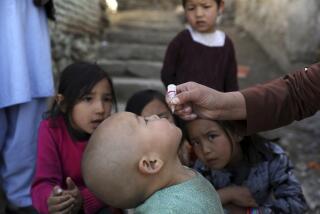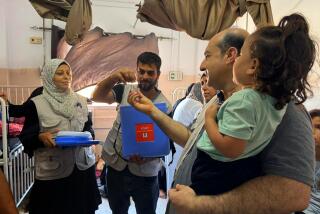In Pakistan, polio vaccines cause for fear
PESHAWAR, PAKISTAN — Whenever Safa sees her father readying the brace, she fidgets and sobs. It’s not very comfortable and already too small, but without it the 2-year-old Pakistani girl would crumple to the floor.
Safa’s right leg is paralyzed, and Tahir Wali now realizes his daughter’s plight was wholly avoidable. The girl’s grandmother repeatedly turned away polio vaccination teams from the family’s front door, convinced that the vaccine sterilizes girls. Like many Pakistanis, she bought into rumors spun by fundamentalist imams who denounce polio vaccination campaigns as a Western plot.
“My mother believed there was a conspiracy to use polio vaccines to keep population growth down by suppressing the fertility rate,” Wali says, cradling Safa in his arms inside his family’s tiny two-room house in the northwestern city of Peshawar. “I should have intervened, but I didn’t.”
In the Western world, polio is largely a forgotten disease, an anachronism that conjures up images of iron lungs and March of Dimes posters. In Pakistan, however, polio remains a scourge that international health organizations have failed to eradicate.
As of Oct. 13, 111 cases of polio had been recorded this year in Pakistan -- second only to the African nation of Chad, where 114 cases have been reported this year. Last year, Pakistan logged 144 cases of polio. Today, Pakistan is one of just four countries where polio is deemed endemic; the other three are Afghanistan, India and Nigeria.
Several factors have stood in the way of eradication. In the country’s volatile tribal areas along the Afghan border, the war against Islamic militants has made it difficult for vaccination teams to make the rounds in villages and towns, where cases of polio continue to spread. The migration of Pakistanis from the country’s northwest to densely populated cities such as Karachi and Quetta has further spread the disease.
Underlying those factors, however, is an intense mistrust among some Pakistanis for the vaccines and the people who supply and administer them. Radical clerics seed rumors that vaccines are un-Islamic because they are made from substances derived from pigs, or that they cause infertility. Some clerics try to convince parents that polio vaccines are made from the urine of Satan.
The reluctance by some Pakistanis to trust polio vaccination programs is also driven by a belief that the U.S. is behind the campaigns. Anti-American sentiments are more fervent than ever in the country, stoked this year by the case of CIA contractor Raymond Davis, who shot to death two Pakistanis in Lahore in January, as well as by President Obama’s decision to not inform Pakistani leaders in advance about the U.S. operation against Osama bin Laden in the city of Abbottabad in May.
Parents’ fears about polio immunization drives were compounded by a CIA-orchestrated phony vaccination campaign aimed at obtaining DNA evidence from Bin Laden’s compound in Abbottabad in the weeks before the U.S. commando raid that killed him.
“People were already suspicious of the objectives of these polio vaccination drives,” says Zaid Khan, 33, a shopkeeper who sells tea leaves in the Peshawar neighborhood of Rashid Garhi, where the refusal rate is high. “The fake campaign in Abbottabad strengthened parents’ resolve against the polio drives. It gave them proof that America’s intentions are bad.”
Most Pakistanis recognize the value of vaccination and allow their children to be immunized. But a stubborn minority of parents, most of them impoverished and poorly educated, refuse to permit immunization teams to step into their homes.
“Pakistan used to have numbers in the thousands in the 1990s, but because we are in eradication mode, even one case is too many for us,” says Elias Durry, senior coordinator for the World Health Organization’s polio eradication effort in Pakistan. “So having more than 100 cases doesn’t help.... Our aim is not just to do things better. Our aim is to finish the job.”
Up until the mid-20th century, polio had been one of the world’s most feared diseases. In the early 1950s, the highly communicable virus, which attacks the nervous system, paralyzed 22,000 Americans each year. The development of a vaccine brought the disease under control in the industrialized world, and in recent decades about $8.2 billion, with significant donations from Microsoft founder Bill Gates, has been spent on immunizing 2.5 billion children throughout the developing world.
In Pakistan, however, eradication is faltering. Peshawar city officials have threatened to arrest parents who consistently bar their children from being vaccinated.
“We try to tell them there’s nothing wrong with the vaccines, that they’re good for their children,” says Irfan Ali Shah, a senior Peshawar health official.
Peshawar shopkeeper Raza Farooq explains why he won’t allow local health workers to vaccinate his 4-year-old daughter and 2-year-old son. “I believe God has given me my children and that God will protect them -- I don’t trust these vaccinators. They give me assurances, but they can’t prove these drops are good for health or that they aren’t expired, or that they won’t produce any side effects.”
Wali, Safa’s father, says the girl’s grandmother has changed her mind about the value of polio vaccinations -- though it took the sight of her granddaughter’s lifeless leg to bring her to that realization. Since Safa contracted polio, other children in the family have been immunized.
“She admits what she did was wrong, but she also knows she can’t do anything about it,” Wali says. “Now she doesn’t refuse the drops.”
alex.rodriguez @latimes.com
More to Read
Sign up for Essential California
The most important California stories and recommendations in your inbox every morning.
You may occasionally receive promotional content from the Los Angeles Times.










